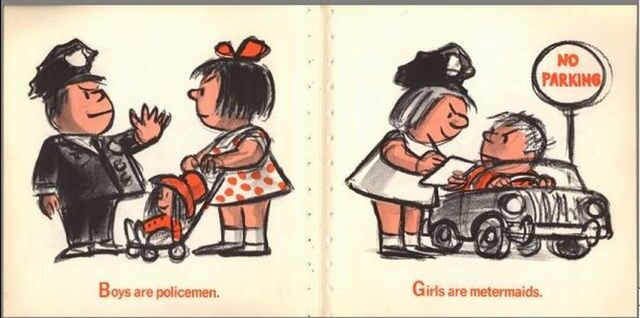By Carmen Chang,
From an early age, children should be instilled with the importance of practicing values such as ethics and morality, fostering an environment where they demonstrate equal treatment between men and women. In this section, we will present some concepts and resources to promote gender equality in our everyday language and speech.
Firstly, we must move away from stereotypes and the tendency to identify certain professions as exclusive to either men or women; society is constantly evolving, and this notion should no longer prevail. In the past, it was traditional for girls to aspire to professions such as babysitters, nurses, domestic cleaners, or teachers, while boys would opt for careers like lawyers, doctors, electricians, or pilots.

Secondly, contrary to what children’s stories, cartoons, and movies often depict, it’s important to distance ourselves from gender patterns and stereotypes. We should not assume that all boys are agile, strong, or brave, and that girls tend to be kind, sweet, or dreamy. This perpetuates the traditional idea that men are the stronger sex and women the weaker.
Many advertising and marketing campaigns for toys, accessories, clothing, etc., condition their target audience to be either boys or girls. Currently, there are campaigns aimed at children and teenagers promoting the use of non-sexist language in classrooms and breaking away from gender stereotypes. However, it’s also necessary for educational manuals and documents to correct language usage that reproduces linguistic sexism, thus promoting a more inclusive language that fosters equal treatment between men and women.
Today, many countries around the world have proposed guidelines to favor a more inclusive and less sexist language. However, these changes and proposals still generate much debate and controversy, and there is still much to be done, as it is not only necessary to change official and administrative documents but also the mindset and society. To achieve this, it is essential to educate children from an early age to use a more inclusive and egalitarian language in their interactions. Women and men should have the same rights, regardless of gender.

We can take as an example the case of the guidelines proposed in Switzerland and Quebec from the document Désexisation et parité linguistique: le cas de la langue française “De-Sexing and Linguistic Parity: The Case of the French Language” in the preface. “For an Epistemology of Gender in French Language Linguistics” by Véronique Perry (2002:5):
“In ‘Écrire les genres en Suisse romande,’ Thérèse Moreau recalls that after the publication in Geneva in 1991 and the reissue in 1999 of the Feminine-Masculine Dictionary of Professions, Titles, and Functions, gender-neutral – non-sexist – drafting of administrative and legislative texts is being implemented in Romandy. The new Swiss federal constitution, which came into force in 2000, broadly considers the principles of non-sexist formulation, including in French. The principles in question, presented here, are outlined in ‘Écrire les genres – Guide d’aide à la rédaction administrative et législative épicène,’ published in 2001, which addresses, in a logical and simple spirit, the ethical, lexical, and syntactical questions posed by jurists, legal scholars, teachers, and anyone interested in ensuring linguistic usage aligns with the implementation of equality in law and in fact between women and men. In ‘La rédaction non sexiste au Québec: le cas de la Fédération des Professionnelles,’ Céline Labrosse shows that the search for non-sexist language appears to meet the expectations of many constituents of Quebec society, according to the numerous emerging practices that question the traditional androcratic perspective of French grammar”.
Reference
- Véronique Perry. “Désexisation et parité linguistique: le cas de la langue française, Ateliers 3 et 30 dans le cadre du 3ème”. Colloque international des recherches féministes francophones.




